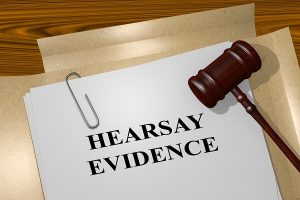
In Wisconsin, any person charged with a felony has a right to a preliminary hearing. A preliminary hearing is the first step in the process. The defendant and their lawyer are not entitled to any evidence against the defendant until after the preliminary hearing. Further, the rules of evidence do not apply in a preliminary hearing, allowing hearsay and other evidence that would not be allowed at trial. In short, it is almost always best to waive your preliminary hearing, and to fight your case after you have the evidence.
In a preliminary hearing the state must establish probable cause that:
1. A crime was committed, and
2. The accused probably committed the crime.
NOTE: All that is needed is someone saying the accused did it, even if they are not believable!
In almost every case, once the State files charges (in the form of a criminal complaint), the judge of the preliminary hearing is likely to find sufficient evidence to bind the case over for trial.
At preliminary hearings, rules of evidence do not apply. The standard at a preliminary hearing is not beyond a reasonable doubt, like it is at trial. Instead, the standard is simply whether you probably committed a felony. This is a very low standard for the state to meet. Hearsay is also admissible at a preliminary hearing. Hearsay is generally not admissible at a trial.
In the majority of preliminary hearings, the investigating officer or an officer that has reviewed the criminal complaint is the only witness that testifies.

Under Wisconsin law, the court is not allowed to consider credibility at a preliminary hearing only plausibility. This means that even if you called a witness to testify to your innocence, that will not get your case dismissed; determining who is telling the truth (credibility) is an issue for the actual trial.
Waiving your preliminary can be potentially beneficial if it is done for strategic reasons and upon advice of a defense attorney. This is usually done to:
1. Prevent evidence that might affect bail status,
2. Avoid preserving witness testimony that could later be used at trial, and
3. Sometimes getting the benefit of the bargain from the State.
If your attorney advises you to waive your hearing, it is important to remember that you are not giving your ability to challenge the constitutionality of law enforcement’s actions or your right to a trial. You also are not admitting your guilt. To put it very simply, you are agreeing that there are certain facts that support the conclusion of probable cause. That is all.
Waiving the right to a preliminary hearing is a big decision that should not be made lightly or without the guidance of an experienced criminal attorney. To speak to an attorney with decades of successful criminal law experience, contact Jones Law Firm LLC today to set up a free consultation. Please contact us by text or phone at (414) 774-6000 or email at laura@jlfwisconsin.com anytime.
*Any articles in the Libra or posted by Jones Law Firm LLC are not legal advice for a particular client or situation. Further no attorney-client relationship is intended or created with this post.*